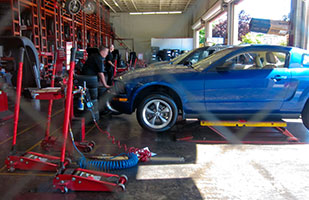Court to Consider Whether Insurance Companies Are Subject to Auto-Repair Consumer Protection Law
Eight Cases To Be Heard Feb. 24 and 25

The Supreme Court will review cases about deadly weapons, a hunting law, and Akron and Cincinnati property-tax disputes.

The Supreme Court will review cases about deadly weapons, a hunting law, and Akron and Cincinnati property-tax disputes.
A state law spelling out how vehicle owners must be notified when aftermarket parts are recommended for auto repairs is central to a case before the Ohio Supreme Court on Tuesday.
In the fall of 2011, Jerry and Nancy Dillon contacted their auto insurer, Farmers Insurance of Columbus, about damage to their vehicle caused by a deer. The Dillons left the two-year-old car at their repair shop, and an insurance company claims representative inspected the damage, prepared a repair estimate, and gave the estimate to the shop. The insurance company’s coverage was based on using both manufacturer and non-manufacturer parts for the repairs.
Mr. Dillon objected to the use of parts not made by the car’s manufacturer, but Farmers wouldn’t pay the difference in cost.
Farmers argues that the state law about non-manufacturer repair parts (R.C. 1345.81), which is part of the Consumer Sales Practices Act (CSPA), doesn’t apply to insurers. The company contends that the insurance industry is regulated by another section of state law and that the CSPA doesn’t govern insurance policy disputes.
The Dillons counter that the quality of some aftermarket parts may jeopardize vehicle safety. They assert that the CSPA law requires informed consent – insurers must inform consumers about auto repairs using non-manufacturer parts and must obtain the insured’s written approval to make repairs with those parts.
Other Cases Before the Court
Along with Farmers Insurance v. Dillons, the court will hear oral arguments in three other cases on Tuesday, Feb. 24. On Wednesday, Feb. 25, the court will consider four matters. Sessions begin at 9 a.m. each day at the Thomas J. Moyer Ohio Judicial Center in Columbus. The arguments will be streamed live online at sc.ohio.gov and broadcast live on The Ohio Channel.
Along with the brief descriptions below, the Office of Public Information today released summaries of each case.
Cases for Tuesday, Feb. 24
In addition to Farmers Insurance, these three cases will be argued before the court:
- The question in Grace Cathedral v. Testa is whether a church dormitory that houses guests should be exempt from property taxes. The Akron church argues the temporary residence qualifies for exemption because it is used to further the organization’s charitable purposes and is an extension of its worship services.
- A Cincinnati 14-year-old was arrested when police discovered he was carrying a loaded handgun later determined not to work. The youth in In re: J.T. contends that his juvenile conviction for carrying a concealed weapon was improper because an inoperable gun isn’t deadly.
- A 1999 University of Akron law school graduate, who served eight months in prison five years ago for preparing false tax returns, has reapplied to take the bar exam. The applicant in this character and fitness case has taken the test several times and failed. The state board that evaluates character and fitness concludes that the applicant doesn’t meet the requirements to practice law and asks that he be prohibited from reapplying to take the test.
Cases for Wednesday, Feb. 25
These four cases are under consideration:
- A Huron County man was fined more than $27,800 for hunting and killing a large white-tailed deer, which was later confiscated, on private property. He argues in Risner v. Ohio Department of Natural Resources that the state agency cannot impose restitution and take possession of the deer. He contends that the statute explicitly allows for one or the other, not both.
- The Butler County mortgage dispute in Lewis v. SRMOF 2009-1 Trust led a court to order a foreclosure. The Trenton homeowner claims a foreclosure cannot be initiated when the mortgage entity doesn’t possess the promissory note along with the mortgage. She argues that this scenario is legally void, because the note and mortgage are inseparable.
- Cincinnati has hired a private company to manage operations at the city’s seven public golf courses. The company receives a hefty annual management fee as well as revenue from food, beverage, and product sales at the courses. In Testa v. Cincinnati, the state’s tax commissioner asserts that the golf courses don’t qualify for a property-tax exemption because they aren’t used exclusively for a public purpose.
- In a second character and fitness review, the state board doesn’t think a Cleveland law school student who served a 16-year sentence when he was younger for drug-related crimes has proven he is rehabilitated and should be allowed to register to practice law and take the bar exam. The board expressed concerns about his involvement, from his 2008 release to 2011, in the production and sale of a type of synthetic marijuana called spice, which wasn’t illegal at the time. Several law professors and eight attorneys from the Cuyahoga County public defender’s office have filed briefs supporting the student.


